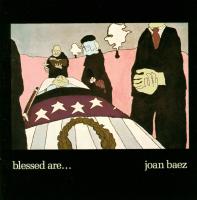| Blessed Are... | ||||
|---|---|---|---|---|
 | ||||
| Studio album by | ||||
| Released | July 31, 1971 | |||
| Recorded | 1971 | |||
| Studio | Quadrafonic Sound (Nashville, Tennessee) [1] | |||
| Genre | ||||
| Length | 78:09 | |||
| Label | Vanguard VSD-6570/1 | |||
| Producer | Norbert Putnam | |||
| Joan Baez chronology | ||||
| ||||
| Review scores | |
|---|---|
| Source | Rating |
| Allmusic | |
| Rolling Stone | (mixed) link |
Blessed Are... is the twelfth studio album (and fourteenth overall) by Joan Baez and her last with Vanguard Records, released in July 1971. It included her hit cover of The Band's "The Night They Drove Old Dixie Down" and songs by Kris Kristofferson, the Beatles, Jesse Winchester, and The Rolling Stones as well as a significant number of Baez' own compositions. Like its immediate predecessors, the album was recorded in Nashville and had a decidedly country feel.
Contents
- Track listing
- Side 1
- Side 2
- Side 3
- Side 4
- Bonus 7"
- Personnel
- Chart positions
- Certifications
- References
The original vinyl version was released as a double album, which also included a bonus 7" 33 1⁄3 rpm record which included the songs "Maria Dolores" and Woody Guthrie's "Deportee", which she dedicated to the farmers of the world, adding "May they soon cease to be victims." On CD pressings, these two tracks are on a separate disc, as the Red Book standards prohibit fitting them on a single, 80-minute disc.
It was Baez' final studio album for Vanguard, her label of the previous eleven years, as she signed with A&M in early 1972.